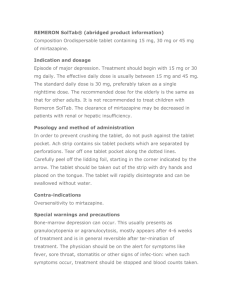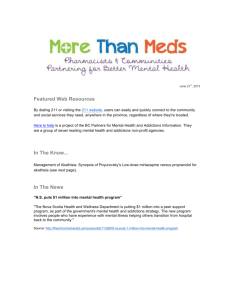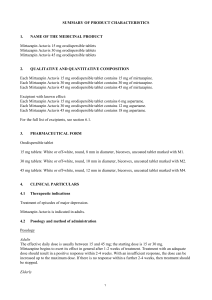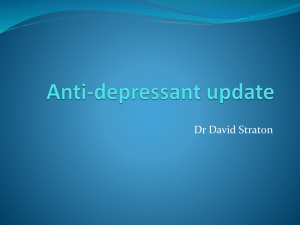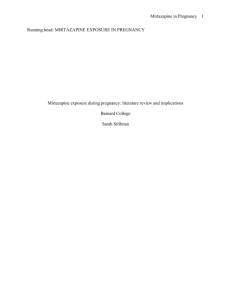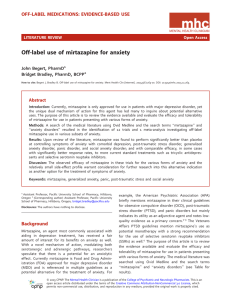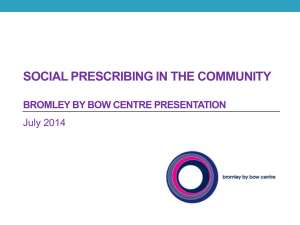SNRIs: an approach - Psychopharmacology Institute
advertisement
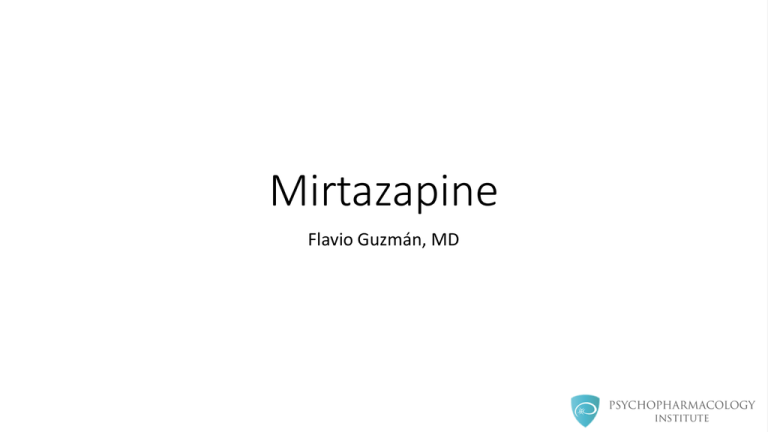
Mirtazapine Flavio Guzmán, MD Mirtazapine- Overview NaSSA (Noradrenergic and specific serotonergic antidepressant) H1 antagonist Sedation and weight gain Used in the elderly population No significant interactions Used as augmenting agent Pharmacology and MOA Mirtazapine Pharmacology • No monoamine reuptake inhibition • Serotonergic and noradrenergic antidepressant • Antagonist at: • a2 • H1 • 5HT2A, 5HT2C, 5HT3 Croom, Katherine F., Caroline M. Perry, and Greg L. Plosker. "Mirtazapine.“ CNS drugs 23.5 (2009): 427-452. Mirtazapine: a2 antagonist a2 receptors • Autoreceptors: noradrenergic neurons • Heteroreceptors: serotonergic neurons Croom, Katherine F., Caroline M. Perry, and Greg L. Plosker. "Mirtazapine.“ CNS drugs 23.5 (2009): 427-452. Mirtazapine blocks a2 presynaptic autoreceptors a2 presynaptic blockade Loss of inhibition Increased NE release Mirtazapine blocks a2 somatodendritic receptors in 5HT neurons = activation Stahl, S M. Stahl's Essential Psychopharmacology: Neuroscientific Basis and Practical Applications. 4thd ed. New York: Cambrigde University Press; 2013 Mirtazapine blocks 5HT3 receptors in the CTZ Kast, R. E., and K. F. Foley. "Cancer chemotherapy and cachexia: mirtazapine and olanzapine are 5‐HT3 antagonists with good antinausea effects." European Journal of Cancer Care 16.4 (2007): 351-354. Effects on other 5HT receptors • Antagonist at: • 5HT2A • 5HT2C Croom, Katherine F., Caroline M. Perry, and Greg L. Plosker. "Mirtazapine.“ CNS drugs 23.5 (2009): 427-452. Clinical Uses FDA-Approved Indications Indication Depression Dosage range 15-45 mg/day Remeron (Mirtazapine) [Prescribing Information] NJ: Merck & Co., Inc. Accessed June 2014 Mirtazapine as augmenting agent • Relatively easy to combine with other antidepressants, “California Rocket Fuel” • Complementary MOA • STAR*D: • Mirtazapine+ Venlafaxine outperformed tranylcypromine (1) • Not statistically significant • Case series of 32 patients (2), response rate (based on CGI scale): • 44% at 4 weeks • 50% at 8 weeks 1. 2. McGrath, Patrick, et al. "Tranylcypromine versus venlafaxine plus mirtazapine following three failed antidepressant medication trials for depression: a STAR* D report." American Journal of Psychiatry 163.9 (2006): 1531-1541. Hannan, Noel, et al. "Venlafaxine—mirtazapine combination in the treatment of persistent depressive illness." Journal of Psychopharmacology 21.2 (2007): 161-164. Other clinical uses • Anxiety disorders: • Panic disorder • Generalized anxiety disorder • Social anxiety disorder • Add-on to antipsychotics in schizophrenia (negative symptoms) • Emesis (5HT3 antagonist) • Insomnia • • Marin, H; Escobar, J. Clinical Psychopharmacology : A Practical Approach. 1st edition. World Scientific Publishing Company, 2013 Phan, S. V., & Kreys, T. J. M. (2011). Adjunct mirtazapine for negative symptoms of schizophrenia. Pharmacotherapy: The Journal of Human Pharmacology and Drug Therapy, 31(10), 1017-1030. Pharmacokinetics Pharmacokinetics • Half-life: 20-40 h • No active metabolites • Not a significant inhibitor • Metabolized by CYP1A2, 2D6 3A4 • No significant DDI Croom, Katherine F., Caroline M. Perry, and Greg L. Plosker. "Mirtazapine.“ CNS drugs 23.5 (2009): 427-452. Adverse Effects Mirtazapine: tolerability profile Sedation: • 50% of patients during first week of treatment Increased appetite: weight gain • 15-25% of patients - Dry mouth - Premarketing studies: agranulocytosis, association not established • • Marin, H; Escobar, J. Clinical Psychopharmacology : A Practical Approach. 1st edition. World Scientific Publishing Company, 2013 Thase,M “Mirtazapine”, in Kaplan and Sadock's Comprehensive Textbook of Psychiatry. 9th ed. Philadelphia: Lippincott Williams & Wilkins, 2009. Mirtazapine: side effects profile Significantly lower frequency of: • Antidepressant-induced sexual dysfunction • Gastrointestinal disturbances • Insomnia Very low risk of sexual dysfunction • • Marin, H; Escobar, J. Clinical Psychopharmacology : A Practical Approach. 1st edition. World Scientific Publishing Company, 2013 Thase,M “Mirtazapine”, in Kaplan and Sadock's Comprehensive Textbook of Psychiatry. 9th ed. Philadelphia: Lippincott Williams & Wilkins, 2009. Prescribing information Mirtazapine dosage forms Tablets (scored) Orally disintegrating tablet 15 mg scored tablet 15 mg orally disintegrating tablet 30 mg scored tablet 30 mg orally disintegrating tablet 45 mg scored tablet 45 mg orally disintegrating tablet Remeron (Mirtazapine) [Prescribing Information] NJ: Merck & Co., Inc. Accessed June 2014 RemeronSolTab (Mirtazapine) [Prescribing Information] NJ: Merck & Co., Inc. Accessed June 2014 Dosage range Indication Dosage range Depression 15-45 mg/day Recommended starting dose: 15 mg/day • When? Preferably in the evening, prior to sleep If patient does not respond • Increase up to 45 mg/day • Dose changes should not be made at intervals of less than 1 to 2 weeks Remeron (Mirtazapine) [Prescribing Information] NJ: Merck & Co., Inc. Accessed June 2014 RemeronSolTab (Mirtazapine) [Prescribing Information] NJ: Merck & Co., Inc. Accessed June 2014 Key Points: Mirtazapine • MOA involves blockade of a2, 5HT2A, 5HT2C and 5HT3 receptors • FDA-approved only for depression • Can be used as augmenting agent in combination with venlafaxine • Prominent side effects: sedation and weight gain • Dosed 15-45 mg/day
